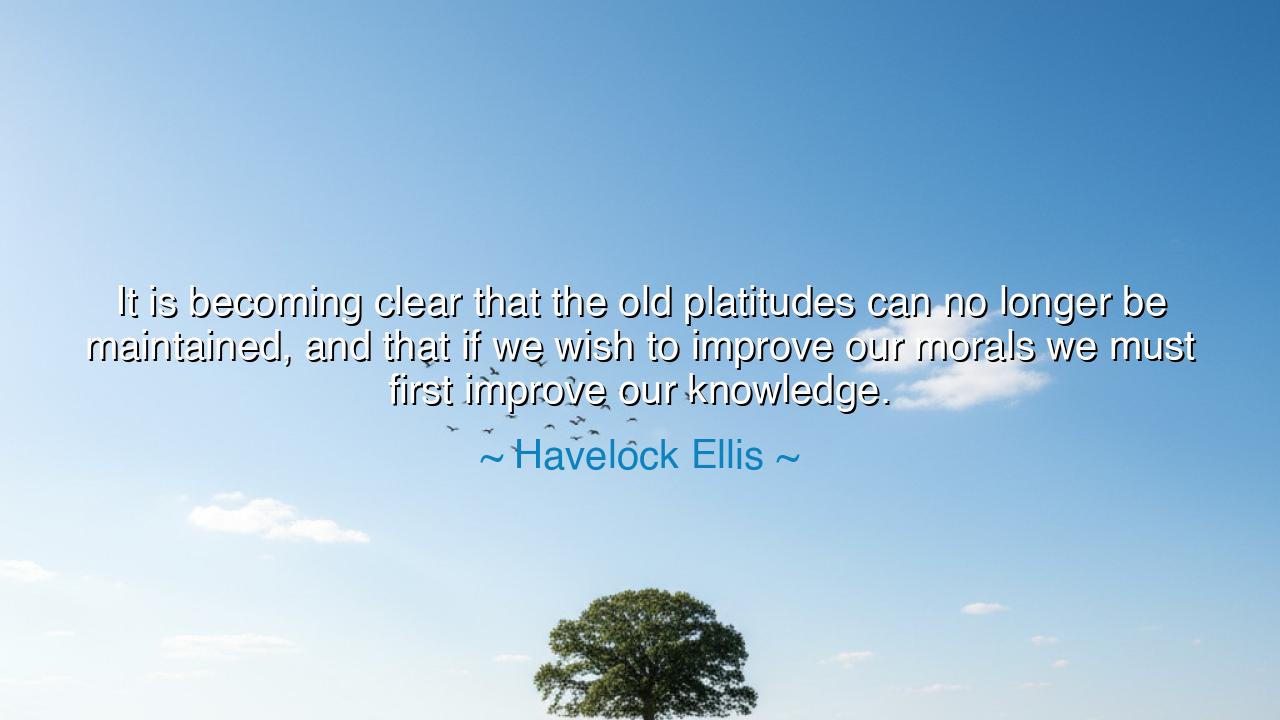
It is becoming clear that the old platitudes can no longer be
It is becoming clear that the old platitudes can no longer be maintained, and that if we wish to improve our morals we must first improve our knowledge.






The words of Havelock Ellis — “It is becoming clear that the old platitudes can no longer be maintained, and that if we wish to improve our morals we must first improve our knowledge” — shine like a flame in the twilight of fading certainties. They come from a time of awakening, when science, reason, and experience began to challenge the rigid dogmas of the past. Yet their meaning is timeless. Ellis reminds us that morality, if not nourished by knowledge, becomes hollow — a shell of inherited words without understanding. The ancients knew that wisdom is not preserved in stone, but renewed in the living mind. To cling blindly to tradition without truth is to worship the shadow and forget the light.
Ellis, a thinker of the late nineteenth and early twentieth centuries, lived in an era when humanity began to question everything — faith, sexuality, politics, and even the nature of virtue itself. He saw that society’s “old platitudes”, its comfortable moral phrases, no longer held power in the face of modern complexity. It was no longer enough to say “this is right” or “that is wrong” without understanding why. For him, the improvement of morals required the expansion of understanding — the courage to see the world as it is, not merely as we are told it should be. He understood that ignorance disguised as righteousness leads to cruelty, while knowledge, when guided by compassion, leads to justice.
In the ancient world, Socrates stood as a living embodiment of this truth. He walked the streets of Athens questioning men who claimed to know virtue, asking them what goodness truly meant. His mission was not to destroy morality, but to purify it through understanding. He was condemned to death for corrupting the youth — yet what he truly did was awaken them. Socrates believed, as Ellis did centuries later, that no man can be truly good unless he first knows what goodness is. To act without understanding is not virtue, but habit — and habit, unexamined, can be as dangerous as vice.
When Ellis speaks of improving knowledge, he is not calling for intellectual pride, but for enlightenment of conscience. True knowledge, in his sense, is not the accumulation of facts, but the cultivation of perception — the ability to see beyond appearances, to question inherited beliefs, to understand the hidden causes of human behavior. Just as a physician cannot heal the body without understanding its wounds, so too a society cannot heal its soul without studying the roots of its moral decay. Blind moralizing cannot cure corruption; only wisdom can.
The truth of this can be seen in the story of Florence Nightingale, who lived not far from Ellis’s time. She transformed the care of the sick not through sermons about charity, but through knowledge — the study of hygiene, data, and discipline. Her morality was not the kind that preaches; it was the kind that acts, informed by reason and observation. She saw that compassion without knowledge is powerless, and knowledge without compassion is empty. In her, Ellis’s philosophy took flesh: by improving understanding, she improved morality — she made kindness effective.
In every age, people are tempted to cling to old platitudes — to repeat the words of morality without renewing their spirit. But Ellis warns us that such repetition is death to truth. The world changes; the human condition evolves. Our understanding of suffering, freedom, and dignity deepens with time. To maintain virtue, we must allow our moral vision to grow alongside our intellectual understanding. When knowledge expands, conscience must follow; when conscience grows, justice is reborn.
The lesson, then, is clear: morality without knowledge is blindness; knowledge without morality is emptiness. The wise must unite the two, as light and flame, thought and heart. We must study not only what is, but what ought to be — not to destroy the moral traditions of the past, but to refine them into truth. Let no one be content with saying “I am good” while refusing to learn, for goodness without wisdom decays into self-deception.
Therefore, let each of us walk the path that Ellis and the ancients illuminated: seek truth before judgment, learning before condemnation, and understanding before pride. For when knowledge deepens, compassion follows; when compassion matures, morality flourishes. In this union of wisdom and virtue, humanity rises — not bound by the dead words of the past, but guided by the living spirit of truth.






AAdministratorAdministrator
Welcome, honored guests. Please leave a comment, we will respond soon